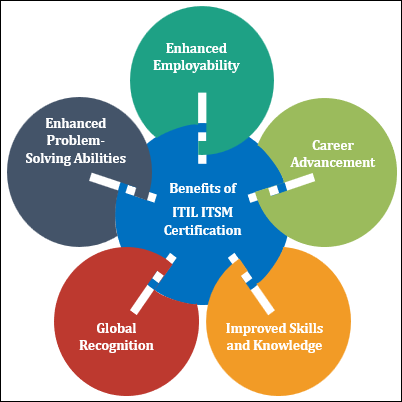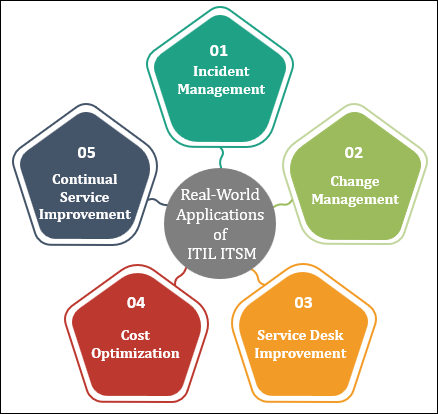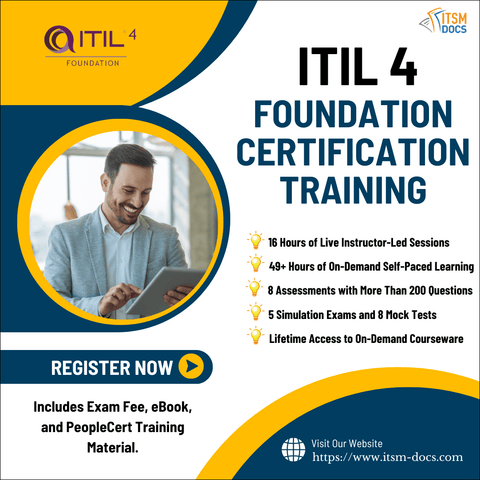ITIL AND ITSM CERTIFICATION
In the ever-evolving landscape of information technology, organizations worldwide rely on robust IT service management (ITSM) practices to deliver efficient, high-quality services to their clients and users. ITIL (Information Technology Infrastructure Library) is a globally recognized framework that provides a structured approach to ITSM.

Acquiring ITIL and ITSM certification can significantly enhance your career prospects and empower you to excel in the IT industry. In this comprehensive blog post, we will explore the ins and outs of ITIL and ITSM certification, from its fundamental concepts to its profound impact on your professional journey.
Understanding ITIL and IT Service Management
Before diving into the depths of ITIL and ITSM certification, it's crucial to grasp the foundation of ITIL and IT service management.
What is ITIL?
ITIL, originally developed by the UK government, is a set of best practices and guidelines for managing IT services. It encompasses a comprehensive framework for service strategy, design, transition, operation, and continual improvement.
The Importance of IT Service Management
ITSM is the discipline that aligns IT services with the needs of the business and ensures the delivery of value. Effective ITSM enhances service quality, reduces costs, and optimizes resource utilization. It's the backbone of modern IT operations.
ITIL and ITSM Certification Levels
ITIL and ITSM certification is offered at different levels, each focusing on specific aspects of ITIL. Let's explore these levels in more detail.
ITIL Foundation
The ITIL Foundation certification provides an introduction to ITIL principles and practices. It covers the key concepts, terminology, and core principles of ITSM. This level serves as the gateway to your ITIL journey.
ITIL Practitioner
ITIL Practitioner builds on the Foundation level, teaching candidates how to adopt and adapt ITIL principles in real-world situations. It focuses on the "how" of ITIL implementation, equipping you with actionable skills.
ITIL Intermediate
The Intermediate level offers two distinct tracks: Service Lifecycle and Service Capability. Candidates can choose the path that aligns with their career goals and interests. Lifecycle focuses on the stages of the service lifecycle, while Capability hones specific ITIL processes and roles.
ITIL Expert
ITIL Expert is an advanced certification level that requires candidates to accumulate credits from both the Foundation and Intermediate levels. It provides a holistic understanding of ITIL practices and positions you as an ITIL authority.
ITIL Master
The highest level of ITIL certification, ITIL Master, demonstrates a deep understanding of ITIL principles and the ability to apply them in complex scenarios. It requires significant practical experience and a portfolio of real-world achievements.
Benefits of ITIL And ITSM Certification
ITIL and ITSM certification offers a multitude of benefits that can significantly impact your career and your organization:
- Enhanced Employability: Certification makes you a sought-after candidate, increasing your chances of landing desired job roles in IT service management.
- Career Advancement: ITIL-certified professionals often progress to higher-level positions with increased responsibilities and higher salaries.
- Improved Skills and Knowledge: Certification programs deepen your understanding of ITIL principles, allowing you to apply them effectively in your job role.
- Global Recognition: ITIL is recognized worldwide, making certified professionals valuable assets in both local and international job markets.
- Enhanced Problem-Solving Abilities: ITIL's structured approach equips you with skills to identify and resolve issues efficiently, contributing to organizational success.
How to Prepare for ITIL And ITSM Certification
Preparing for ITIL And ITSM certification requires a structured approach to ensure success. Here's a concise guide to help you get ready:
- Select the Right Certification Level: Choose the ITIL certification level that matches your experience and career goals, whether it's Foundation for beginners or higher levels for advanced professionals.
- Enroll in Accredited Training: Consider enrolling in an accredited ITIL training program, which provides structured learning, expert guidance, and interactive sessions.
- Self-Study: Alternatively, if you prefer self-study, use official ITIL publications, practice exams, and online resources to cover all exam objectives.
- Practice Exams: Take practice exams to gauge your knowledge and identify weak areas for further study.
- Exam Registration: Register for the certification exam, ensuring you meet all prerequisites and understand exam details.
- Exam Day: On the exam day, stay calm, manage your time wisely, and carefully follow instructions.
- Post-Exam Activities: After passing, celebrate your achievement, and consider advancing to higher ITIL levels or specializing in specific areas for ongoing professional growth.
Real-World Applications of ITIL And ITSM
Real-world applications of ITIL and ITSM principles have a profound impact on various industries:
- Incident Management: In healthcare, ITIL helps hospitals swiftly resolve critical equipment failures, ensuring patient safety and uninterrupted care.
- Change Management: Telecom companies use ITIL to implement network upgrades without service disruptions, enhancing customer satisfaction.
- Service Desk Improvement: E-commerce businesses leverage ITIL to streamline customer support, reducing response times and resolving issues efficiently.
- Cost Optimization: Manufacturing companies optimize IT resources using ITIL, reducing overhead costs while maintaining production efficiency.
- Continual Service Improvement (CSI): IT consulting firms apply ITIL CSI to refine service offerings, staying agile in a rapidly evolving tech landscape.

The Future of ITIL And ITSM
The future of ITIL and ITSM is promising, driven by evolving technological trends and the need for adaptable service management practices:
- ITIL 4: ITIL 4, the latest iteration of the framework, embraces modern practices such as Agile and DevOps. It aligns IT service management with broader business objectives and emphasizes flexibility.
- Digital Transformation: As organizations continue their digital transformation journeys, ITIL and ITSM will play pivotal roles in managing and optimizing digital services, ensuring a seamless transition to digital business models.
- Cybersecurity: In an era of increasing cyber threats, ITIL's structured approach to incident management and problem resolution will be essential in bolstering cybersecurity strategies.
- Cloud Computing: With the ongoing migration to the cloud, ITIL practices will help organizations efficiently manage and govern their cloud services, ensuring cost-effectiveness and agility.
Conclusion
ITIL and ITSM certification is a transformative journey that equips IT professionals with the knowledge and skills to excel in the dynamic world of IT service management. By selecting the appropriate certification level, enrolling in accredited training, and diligent self-study, you can unlock new career opportunities and enhance your expertise.
The real-world applications of ITIL and ITSM principles in incident management, change management, service desk improvement, cost optimization, and continual service improvement highlight its practical significance across diverse industries. Embracing ITIL and ITSM certification is a commitment to personal and professional growth, positioning you as a valuable asset in today's ever-evolving IT landscape.
Link To Download Your ITIL Certificate: https://www.peoplecert.org/for-corporations/certificate-verification-service







